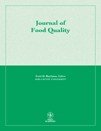
JOURNAL OF FOOD QUALITY
Scope & Guideline
Nurturing Quality and Safety in Food Research
Introduction
Aims and Scopes
- Food Safety and Microbiology:
Research in this area emphasizes the importance of food safety practices, microbial contamination, and the development of methods to ensure the microbiological quality of food products. - Nutritional Quality and Functional Foods:
This scope encompasses studies on the nutritional composition of food products, the health benefits of functional foods, and the investigation of bioactive compounds that enhance health outcomes. - Food Processing and Preservation Techniques:
The journal covers innovative processing methods, packaging technologies, and preservation techniques aimed at extending the shelf life and maintaining the quality of food products. - Sensory Evaluation and Consumer Acceptance:
Research focusing on sensory characteristics of food, including taste, aroma, and texture, and how these factors influence consumer preferences and acceptance. - Food Quality Assessment and Standards:
This area includes the development and application of methodologies for assessing food quality, including physical, chemical, and sensory evaluations. - Emerging Technologies in Food Science:
The journal also explores the application of novel technologies, such as machine learning and artificial intelligence, in enhancing food quality and safety.
Trending and Emerging
- Sustainable and Eco-friendly Food Practices:
There is a growing emphasis on sustainability within food production and processing, with research focusing on eco-friendly practices, waste reduction, and environmentally sustainable packaging solutions. - Functional Foods and Nutraceuticals:
Research on functional foods that provide health benefits beyond basic nutrition is on the rise, indicating increased consumer interest in health-promoting food products. - Advanced Food Preservation Techniques:
Emerging technologies, such as non-thermal processing and novel preservation methods, are gaining traction, aiming to extend shelf life while preserving nutritional and sensory qualities. - Artificial Intelligence and Machine Learning Applications:
The integration of AI and machine learning in food quality assessment and management is trending, showcasing innovative approaches to enhance food safety, efficiency, and quality control. - Food Safety and Risk Assessment:
There is a heightened focus on comprehensive food safety strategies and risk assessments, particularly in light of global food safety challenges and public health concerns. - Health Impacts of Food Components:
Research exploring the health impacts of specific food components, including functional ingredients and their roles in preventing diseases, is increasingly prevalent.
Declining or Waning
- Traditional Food Processing Methods:
There is a noticeable decline in research related to conventional food processing techniques, as the focus shifts towards innovative and advanced processing methods that promise better quality and safety. - General Food Chemistry Studies:
The journal has seen a reduction in papers solely focused on basic food chemistry without practical applications, reflecting a trend towards more applied research with direct implications for food quality. - Food Quality in Agricultural Practices:
With the increasing emphasis on technology in food production, traditional agricultural practices and their direct impact on food quality are receiving less attention in recent publications. - Consumer Behavior Studies:
Research focused on general consumer behavior regarding food quality has decreased, possibly due to a shift towards more specific studies that align with current trends in health and sustainability.
Similar Journals
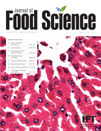
JOURNAL OF FOOD SCIENCE
Transforming Discoveries into Practical SolutionsJOURNAL OF FOOD SCIENCE, published by Wiley, is a premier journal dedicated to advancing the field of food science, bridging the gap between fundamental research and practical application. With an impressive impact factor reflecting its authoritative status, the journal is ranked in the Q1 quartile for Food Science in 2023 and boasts a Scopus ranking of #71 out of 389, placing it in the 81st percentile within Agricultural and Biological Sciences. First launched in 1936, the journal continues to serve as an essential platform for researchers, professionals, and students to disseminate innovative studies and reviews that address critical issues in food quality, safety, and technology. While not currently offering open access, its rigorous peer-review process ensures the dissemination of high-quality and impactful research. Researchers engaged in the vital disciplines of food science will find this journal indispensable for keeping abreast of cutting-edge developments in the field.
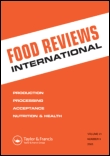
FOOD REVIEWS INTERNATIONAL
Unlocking the Secrets of Food Science ExcellenceFOOD REVIEWS INTERNATIONAL, published by Taylor & Francis Inc, serves as a pivotal resource within the fields of Food Science and Chemical Engineering. Established in 1985, this esteemed journal offers a comprehensive platform for the dissemination of critical reviews that enhance understanding and innovation in the food industry. With an impressive impact factor reflecting its Q1 quartiles in both Food Science and Chemical Engineering categories, it ranks among the top journals in Scopus, securing the 24th spot in Agricultural and Biological Sciences. Scholars, researchers, and professionals are encouraged to explore its rich content, which spans meticulously reviewed articles that bridge academic research and practical applications, while contributing to advancements in food safety, processing, and sustainability. Although not an Open Access journal, access to its extensive repository is vital for anyone aiming to stay at the forefront of food science advancements.

CZECH JOURNAL OF FOOD SCIENCES
Transforming Food Systems Through Rigorous ResearchCzech Journal of Food Sciences is a premier publication in the field of food science, disseminating vital research since its inception in 1999 and transitioning to Open Access in 2007. Published by the Czech Academy Agricultural Sciences, this journal facilitates the exchange of knowledge among researchers, professionals, and students dedicated to advancing the understanding of food systems, safety, and technology. With an ISSN of 1212-1800 and an E-ISSN of 1805-9317, it holds a respectable position with a Q3 ranking in the Food Science category for 2023, illustrating its commitment to high-quality research despite its Scopus rank of 209 out of 389, situated in the 46th percentile. Located in the heart of the Czech Republic, at TESNOV 17, PRAGUE 117 05, this journal serves as an essential resource for those involved in agricultural and biological sciences, paving the way for innovative discoveries and applications in food science.
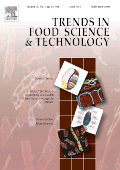
TRENDS IN FOOD SCIENCE & TECHNOLOGY
Unveiling the latest advancements in food science.Trends in Food Science & Technology, published by Elsevier Science London, stands as a premier journal in the fields of food science and biotechnology. With an impressive Q1 ranking in both the food science and biotechnology categories, it is recognized for its rigorous peer-reviewed articles that advance knowledge and innovation in the sector. The journal’s Scopus rankings validate its significance, placing it in the top percentile among its peers, with a remarkable rank of #2 out of 389 in Agricultural and Biological Sciences - Food Science, and #4 out of 311 in Biochemistry, Genetics, and Molecular Biology - Biotechnology. Since its inception in 1990, the journal has become a vital resource for researchers, professionals, and students alike, offering insights into contemporary challenges and trends impacting food technology. Although it operates under a subscription model, the quality of research published within its pages makes it an essential read for anyone involved in advancing the science of food.
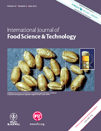
INTERNATIONAL JOURNAL OF FOOD SCIENCE AND TECHNOLOGY
Unveiling Insights for a Sustainable Food FutureINTERNATIONAL JOURNAL OF FOOD SCIENCE AND TECHNOLOGY, published by WILEY, serves as a premier platform for the dissemination of cutting-edge research in the field of food science and technology. With an ISSN of 0950-5423 and E-ISSN 1365-2621, this journal has been committed to publishing high-quality research since 1966 and is set to continue its impactful contributions through 2024. Recognized for its excellence, it holds a Q1 ranking in Food Science and a Q2 ranking in Industrial and Manufacturing Engineering as of 2023. The journal ranks #95/384 in Industrial and Manufacturing Engineering and #100/389 in Food Science on Scopus, placing it within the top quartiles of these fields. Although it does not currently offer Open Access, researchers and professionals benefit from access to a wealth of knowledge that advances understanding in both applied and theoretical aspects of food science. This journal is indispensable for anyone in the academic and professional domains who seeks to stay abreast of innovations and trends shaping the food industry.

JOURNAL OF THE JAPANESE SOCIETY FOR FOOD SCIENCE AND TECHNOLOGY-NIPPON SHOKUHIN KAGAKU KOGAKU KAISHI
Empowering Researchers in the World of Food ScienceWelcome to the JOURNAL OF THE JAPANESE SOCIETY FOR FOOD SCIENCE AND TECHNOLOGY-NIPPON SHOKUHIN KAGAKU KOGAKU KAISHI, a pivotal platform for the advancement of food science and technology. Published by the Japan Society for Food Science and Technology, this esteemed journal has been contributing to the field since 1995 and continues to publish innovative research and reviews that foster knowledge and collaboration among researchers, professionals, and students interested in food science. Although it currently holds a Q4 ranking within the Food Science category, the journal's commitment to disseminating valuable insights showcases its potential as a resource for emerging trends and applications in food technology. While it does not offer open access options, it maintains a rigorous peer-review process to ensure the quality of its content. As this journal progresses into its convergence years through 2024, it remains an essential resource for those passionate about exploring the intersections of food science and technology in Japan and beyond.
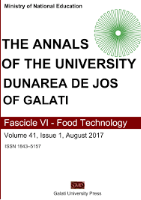
Annals of the University Dunarea de Jos of Galati, Fascicle VI-Food Technology
Transforming Insights into Food SolutionsAnnals of the University Dunarea de Jos of Galati, Fascicle VI-Food Technology is a distinguished academic journal published by GALATI UNIV PRESS, dedicated to advancing knowledge in the field of food technology. With an open access format since 2007, this journal enhances accessibility to research findings and facilitates the dissemination of innovative ideas among researchers, professionals, and students worldwide. The journal holds a noteworthy position in its category, boasting a 2023 Q3 ranking in both Food Science and Industrial and Manufacturing Engineering, indicating its relevance and contribution to these critical fields. As it converges years of publication from 2012 to 2023, it encapsulates an evolving body of knowledge that reflects the latest advancements and research trends. Although it may not yet have a defined HIndex, its presence in Scopus with ranks of #253 in Industrial and Manufacturing Engineering and #278 in Food Science underscores its emerging impact. This journal is particularly significant for those engaged in research related to food technology and engineering, facilitating dialogue and collaboration within the community while addressing pressing challenges and innovations in food processing and safety. With its commitment to quality research, Annals of the University Dunarea de Jos of Galati serves as an essential resource for fostering knowledge and promoting scientific discussion.
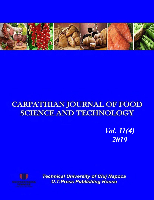
Carpathian Journal of Food Science and Technology
Exploring Culinary Frontiers Through ResearchCarpathian Journal of Food Science and Technology, a distinguished publication from the NORTH UNIV CENTER BAIA MARE, has been a pivotal platform for disseminating groundbreaking research in the field of food science since its inception in 2009. With an ISSN of 2066-6845 and an E-ISSN of 2344-5459, this Open Access journal aims to promote knowledge and innovation, offering unrestricted access to its content, thereby enhancing visibility for authors and facilitating a wider readership. Based in Romania, the journal plays a crucial role in advancing scientific inquiry within the agricultural and biological sciences, particularly focusing on contemporary food science issues. As it continues its convergence through 2024, the journal currently holds a Q4 ranking in the Food Science category, allowing it to carve out a unique niche within the academic community despite its current Scopus percentile ranking of 19th. Scholars, researchers, and students in the field will find the journal an invaluable resource for the latest advancements and discussions, making it an essential addition to their academic pursuits.

Food Science of Animal Resources
Pioneering Insights in Animal Resources and NutritionFood Science of Animal Resources is a prestigious, peer-reviewed journal published by the Korean Society of Food Science and Animal Resources, serving as a vital platform for disseminating advanced research in the fields of Animal Science and Food Science. Since its inception in 2018, the journal has quickly established itself with an impressive Q1 ranking in both categories for 2023, indicating its relevance and influence in the academic community—evident by its ranking of #23 in Animal Science and Zoology and #78 in Food Science among thousands of journals. Operating on an Open Access model since 2019, it enables unrestricted access to cutting-edge research for a global audience, facilitating collaboration and innovation. Its commitment to quality and rigor makes it an essential resource for researchers, professionals, and students dedicated to advancing knowledge in food safety, nutrition, and sustainable practices within the animal resource sector. Set against the vibrant backdrop of South Korea, the journal aims to bridge gaps in knowledge and foster communication among scholars and practitioners worldwide.

Acta Scientiarum Polonorum-Technologia Alimentaria
Fostering Collaboration for Sustainable Food PracticesActa Scientiarum Polonorum-Technologia Alimentaria, published by Poznan University of Life Sciences, is a revered journal in the field of food science, showcasing cutting-edge research and innovations in food technology. Established as a leading platform within its domain, this journal is indexed under Scopus and ranks in the 2023 Q3 quartile for Food Science, demonstrating its commitment to high-quality scholarship. With an ISSN of 1644-0730 and E-ISSN 1898-9594, it serves as a critical resource for researchers, professionals, and students seeking to stay at the forefront of advancements in food safety, quality control, and sustainable practices. The journal has also been recognized for its contributions to the agricultural and biological sciences, positioning itself at rank #205 out of 389 in this competitive field. While currently not offering open access, the journal's valuable insights and findings, especially as it publishes through 2024, play a crucial role in advancing knowledge and fostering collaboration among experts in the food science sector.